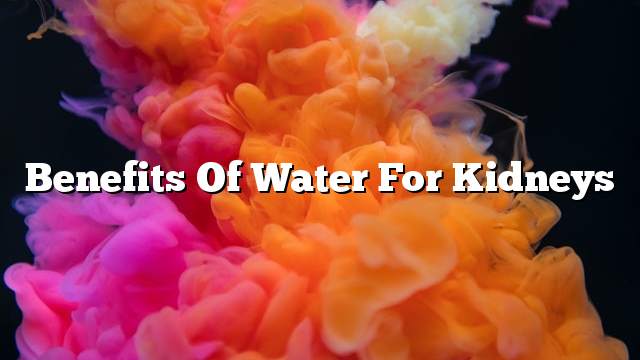water
There is a set of natural resources that can not be dispensed with for the survival of living organisms, especially human beings, including water. He said: “We made water from everything living.” Water has a wide range of benefits on human health, including: , Maintain optimal body temperature, renew cells and tissues, increase brain activity and ability to think and concentrate, protect the skin from dehydration, which is very useful for kidneys.
Kidneys
It is one of the vital organs in the human body, which is located close to the lower back, and the right kidney is slightly higher than the left kidney, which is small in size, resembling the beans, but it is important for the body; it is rid of all toxins and substances that are useless and redundant, So rid of accumulated fluid by sending it to the bladder to remove it in the form of urine.
The importance of water for kidneys
- Accelerate the action of kidneys in expelling toxins from the body, and output them to the form of urine.
- Kidney protection from kidney disease is the accumulation of fluid in the kidney and the inability to get out due to genetic factors or because of the presence of deposits in the ureter; water in the second case works to remove the sediment from the ureter and remove it with the urine, and thus the descent of fluid from the kidney to the ureter easily .
- Prevent the formation of gravel, because of the ability of water to remove the salt deposits periodically from the kidneys, and sometimes may dissolve the gravel if small.
- Protection against bacterial infections that may occur in the kidneys and urinary tract.
Kidney diseases caused by lack of drinking water
- Kidney and bladder infections caused by microbes accumulated in those organs.
- Kidney stones and saline deposits may be as serious as they are still by laser dissection or surgery.
- Kidney failure: It is one of the most difficult kidney diseases that cause severe pain, and the best solution to treat it is a new kidney transplant from a donor.
Symptoms of kidney disease
- The feet and leg bulge dramatically.
- Increased heart rate.
- Lose weight significantly.
- Nausea and sometimes vomiting.
- Low ability to remove urine from the body.
- Heartburn in the ureter when urine is removed.
- The color of urine has changed to become dark and yellowish.
- Shortness of breath and feeling tired and heavy due to accumulation of fluid in the chest.
The adult must drink at least 2 liters of water per day, preferably before eating, or after half an hour, so as not to cause indigestion.
